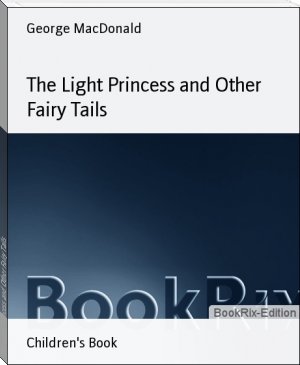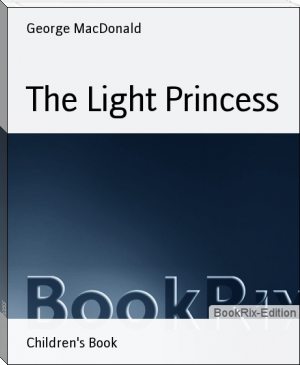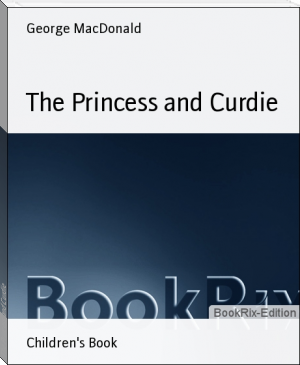The Light Princess and Other Fairy Tails - George MacDonald (best books to read now .TXT) 📗

- Author: George MacDonald
Book online «The Light Princess and Other Fairy Tails - George MacDonald (best books to read now .TXT) 📗». Author George MacDonald
the heart. She thought she heard the giant give a far-off roar of pain, and she nearly fell from her seat with terror. The heart instantly began to shrink. It shrunk and shrivelled till it was nearly gone; and Buffy-Bob caught it up and put it into his bag. Then the two spiders turned and went down again as fast as they could. Before they got to the bottom, they heard the shrieks of the she-eagle over the loss of her egg; but the spiders told them not to be alarmed, for her eyes were too big to see them.-By the time they reached the foot of the mountain, all the spiders had got home, and were busy again catching flies, as if nothing had happened.
After renewed thanks to their friends, the children set off, carrying the giant's heart with them.
"If you should find it at all troublesome, just give it a little more spider-juice directly," said the grandfather, as they took their leave.
Now, the giant had given an awful roar of pain the moment they anointed his heart, and had fallen down in a fit, in which he lay so long that all the boys might have escaped if they had not been so fat. One did, and got home in safety. For days the giant was unable to speak. The first words he uttered were,-
"Oh, my heart! my heart!"
"Your heart is safe enough, dear Thunderstump," said his wife. "Really, a man of your size ought not to be so nervous and apprehensive. I am ashamed of you."
"You have no heart, Doodlem," answered he. "I assure you that at this moment mine is in the greatest danger. It has fallen into the hands of foes, though who they are I cannot tell."
Here he fainted again; for Tricksey-Wee, finding the heart begin to swell a little, had given it the least touch of spider-juice.
Again he recovered, and said,-
"Dear Doodlem, my heart is coming back to me. It is coming nearer and nearer."
After lying silent for hours, he exclaimed,-
"It is in the house, I know!"
And he jumped up and walked about, looking in every corner.
As he rose, Tricksey-Wee and Buffy-Bob came out of the hole in the tree-root, and through the cat-hole in the door, and walked boldly towards the giant. Both kept their eyes busy watching him. Led by the love of his own heart, the giant soon spied them, and staggered furiously towards them.
"I will eat you, you vermin!" he cried. "Here with my heart!"
Tricksey gave the heart a sharp pinch. Down fell the giant on his knees, blubbering, and crying, and begging for his heart.
"You shall have it, if you behave yourself properly," said Tricksey.
"How shall I behave myself properly?" asked he, whimpering.
"Take all those boys and girls, and carry them home at once."
"I'm not able; I'm too ill. I should fall down."
"Take them up directly."
"I can't, till you give me my heart."
"Very well!" said Tricksey; and she gave the heart another pinch.
The giant jumped to his feet, and catching up all the children, thrust some into his waistcoat pockets, some into his breast pocket, put two or three into his hat, and took a bundle of them under each arm. Then he staggered to the door.
All this time poor Doodlem was sitting in her arm-chair, crying, and mending a white stocking.
The giant led the way to the borders. He could not go so fast but that Buffy and Tricksey managed to keep up with him. When they reached the borders, they thought it would be safer to let the children find their own way home. So they told him to set them down. He obeyed.
"Have you put them all down, Mr. Thunderthump?" asked Tricksey-Wee.
"Yes," said the giant.
"That's a lie!" squeaked a little voice; and out came a head from his waistcoat pocket.
Tricksey-Wee pinched the heart till the giant roared with pain.
"You're not a gentleman. You tell stories," she said.
"He was the thinnest of the lot," said Thunderthump, crying.
"Are you all there now, children?" asked Tricksey.
"Yes, ma'am," returned they, after counting themselves very carefully, and with some difficulty; for they were all stupid children.
"Now," said Tricksey-Wee to the giant, "will you promise to carry off no more children, and never to eat a child again all you life?"
"Yes, yes! I promise," answered Thunderthump, sobbing.
"And you will never cross the borders of Giantland?"
"Never."
"And you shall never again wear white stockings on a Sunday, all your life long.-Do you promise?"
The giant hesitated at this, and began to expostulate; but Tricksey-Wee, believing it would be good for his morals, insisted; and the giant promised.
Then she required of him, that, when she gave him back his heart, he should give it to his wife to take care of for him for ever after.
The poor giant fell on his knees, and began again to beg. But Tricksey-Wee giving the heart a slight pinch, he bawled out,-
"Yes, yes! Doodlem shall have it, I swear. Only she must not put it in the flour-barrel, or in the dust-hole."
"Certainly not. Make your own bargain with her.-And you promise not to interfere with my brother and me, or to take any revenge for what we have done?"
"Yes, yes, my dear children; I promise everything. Do, pray, make haste and give me back my poor heart."
"Wait there, then, till I bring it to you."
"Yes, yes. Only make haste, for I feel very faint."
Tricksey-Wee began to undo the mouth of the bag. But Buffy-Bob, who had got very knowing on his travels, took out his knife with the pretence of cutting the string; but, in reality, to be prepared for any emergency.
No sooner was the heart out of the bag, than it expanded to the size of a bullock; and the giant, with a yell of rage and vengeance, rushed on the two children, who had stepped sideways from the terrible heart. But Buffy-Bob was too quick for Thunderthump. He sprang to the heart, and buried his knife in it, up to the hilt. A fountain of blood spouted from it; and with a dreadful groan the giant fell dead at the feet of little Tricksey-Wee, who could not help being sorry for him after all.
THE GOLDEN KEY.
There was a boy who used to sit in the twilight and listen to his great-aunt's stories.
She told him that if he could reach the place where the end of the rainbow stands he would find there a golden key.
"And what is the key for?" the boy would ask. "What is it the key of? What will it open?"
"That nobody knows," his aunt would reply. "He has to find that out."
"I suppose, being gold," the boy once said, thoughtfully, "that I could get a good deal of money for it if I sold it."
"Better never find it than sell it," returned his aunt. And then the boy went to bed and dreamed about the golden key.
Now, all that his great-aunt told the boy about the golden key would have been nonsense, had it not been that their little house stood on the borders of Fairyland. For it is perfectly well known that out of Fairyland nobody ever can find where the rainbow stands. The creature takes such good care of its golden key, always flitting from place to place, lest anyone should find it! But in Fairyland it is quite different. Things that look real in this country look very thin indeed in Fairyland, while some of the things that here cannot stand still for a moment, will not move there. So it was not in the least absurd of the old lady to tell her nephew such things about the golden key.
"Did you ever know anybody find it?" he asked one evening.
"Yes. Your father, I believe, found it."
"And what did he do with it, can you tell me?"
"He never told me."
"What was it like?"
"He never showed it to me."
"How does a new key come there always?"
"I don't know. There it is."
"Perhaps it is the rainbow's egg."
"Perhaps it is. You will be a happy boy if you find the nest."
"Perhaps it comes tumbling down the rainbow from the sky."
"Perhaps it does."
One evening, in summer, he went into his own room, and stood at the lattice-window, and gazed into the forest which fringed the outskirts of Fairyland. It came close up to his great-aunt's garden, and, indeed, sent some straggling trees into it. The forest lay to the east, and the sun, which was setting behind the cottage, looked straight into the dark wood with his level red eye. The trees were all old, and had few branches below, so that the sun could see a great way into the forest; and the boy, being keen-sighted, could see almost as far as the sun. The trunks stood like rows of red columns in the shine of the red sun, and he could see down aisle after aisle in the vanishing distance. And as he gazed into the forest he began to feel as if the trees were all waiting for him, and had something they could not go on with till he came to them. But he was hungry, and wanted his supper. So he lingered.
Suddenly, far among the trees, as far as the sun could shine, he saw a glorious thing. It was the end of a rainbow, large and brilliant. He could count all the seven colours, and could see shade after shade beyond the violet; while before the red stood a colour more gorgeous and mysterious still. It was a colour he had never seen before. Only the spring of the rainbow-arch was visible. He could see nothing of it above the trees.
"The golden key!" he said to himself, and darted out of the house, and into the wood.
He had not gone far before the sun set. But the rainbow only glowed the brighter: for the rainbow of Fairyland is not dependent upon the sun as ours is. The trees welcomed him. The bushes made way for him. The rainbow grew larger and brighter; and at length he found himself within two trees of it.
It was a grand sight, burning away there in silence, with its gorgeous, its lovely, its delicate colours, each distinct, all combining. He could now see a great deal more of it. It rose high into the blue heavens, but bent so little that he could not tell how high the crown of the arch must reach. It was still only a small portion of a huge bow.
He stood gazing at it till he forgot himself with delight-even forgot the key which he had come to seek. And as he stood it grew more wonderful still. For in each of the colours, which was as large as the column of a church, he could faintly see beautiful forms slowly ascending as if by the steps of a winding stair. The forms appeared irregularly-now one, now many, now several, now none-men and women and children-all different, all beautiful.
He drew nearer to the rainbow. It vanished. He started back a step in dismay. It was there again, as beautiful as ever. So he contented himself with
After renewed thanks to their friends, the children set off, carrying the giant's heart with them.
"If you should find it at all troublesome, just give it a little more spider-juice directly," said the grandfather, as they took their leave.
Now, the giant had given an awful roar of pain the moment they anointed his heart, and had fallen down in a fit, in which he lay so long that all the boys might have escaped if they had not been so fat. One did, and got home in safety. For days the giant was unable to speak. The first words he uttered were,-
"Oh, my heart! my heart!"
"Your heart is safe enough, dear Thunderstump," said his wife. "Really, a man of your size ought not to be so nervous and apprehensive. I am ashamed of you."
"You have no heart, Doodlem," answered he. "I assure you that at this moment mine is in the greatest danger. It has fallen into the hands of foes, though who they are I cannot tell."
Here he fainted again; for Tricksey-Wee, finding the heart begin to swell a little, had given it the least touch of spider-juice.
Again he recovered, and said,-
"Dear Doodlem, my heart is coming back to me. It is coming nearer and nearer."
After lying silent for hours, he exclaimed,-
"It is in the house, I know!"
And he jumped up and walked about, looking in every corner.
As he rose, Tricksey-Wee and Buffy-Bob came out of the hole in the tree-root, and through the cat-hole in the door, and walked boldly towards the giant. Both kept their eyes busy watching him. Led by the love of his own heart, the giant soon spied them, and staggered furiously towards them.
"I will eat you, you vermin!" he cried. "Here with my heart!"
Tricksey gave the heart a sharp pinch. Down fell the giant on his knees, blubbering, and crying, and begging for his heart.
"You shall have it, if you behave yourself properly," said Tricksey.
"How shall I behave myself properly?" asked he, whimpering.
"Take all those boys and girls, and carry them home at once."
"I'm not able; I'm too ill. I should fall down."
"Take them up directly."
"I can't, till you give me my heart."
"Very well!" said Tricksey; and she gave the heart another pinch.
The giant jumped to his feet, and catching up all the children, thrust some into his waistcoat pockets, some into his breast pocket, put two or three into his hat, and took a bundle of them under each arm. Then he staggered to the door.
All this time poor Doodlem was sitting in her arm-chair, crying, and mending a white stocking.
The giant led the way to the borders. He could not go so fast but that Buffy and Tricksey managed to keep up with him. When they reached the borders, they thought it would be safer to let the children find their own way home. So they told him to set them down. He obeyed.
"Have you put them all down, Mr. Thunderthump?" asked Tricksey-Wee.
"Yes," said the giant.
"That's a lie!" squeaked a little voice; and out came a head from his waistcoat pocket.
Tricksey-Wee pinched the heart till the giant roared with pain.
"You're not a gentleman. You tell stories," she said.
"He was the thinnest of the lot," said Thunderthump, crying.
"Are you all there now, children?" asked Tricksey.
"Yes, ma'am," returned they, after counting themselves very carefully, and with some difficulty; for they were all stupid children.
"Now," said Tricksey-Wee to the giant, "will you promise to carry off no more children, and never to eat a child again all you life?"
"Yes, yes! I promise," answered Thunderthump, sobbing.
"And you will never cross the borders of Giantland?"
"Never."
"And you shall never again wear white stockings on a Sunday, all your life long.-Do you promise?"
The giant hesitated at this, and began to expostulate; but Tricksey-Wee, believing it would be good for his morals, insisted; and the giant promised.
Then she required of him, that, when she gave him back his heart, he should give it to his wife to take care of for him for ever after.
The poor giant fell on his knees, and began again to beg. But Tricksey-Wee giving the heart a slight pinch, he bawled out,-
"Yes, yes! Doodlem shall have it, I swear. Only she must not put it in the flour-barrel, or in the dust-hole."
"Certainly not. Make your own bargain with her.-And you promise not to interfere with my brother and me, or to take any revenge for what we have done?"
"Yes, yes, my dear children; I promise everything. Do, pray, make haste and give me back my poor heart."
"Wait there, then, till I bring it to you."
"Yes, yes. Only make haste, for I feel very faint."
Tricksey-Wee began to undo the mouth of the bag. But Buffy-Bob, who had got very knowing on his travels, took out his knife with the pretence of cutting the string; but, in reality, to be prepared for any emergency.
No sooner was the heart out of the bag, than it expanded to the size of a bullock; and the giant, with a yell of rage and vengeance, rushed on the two children, who had stepped sideways from the terrible heart. But Buffy-Bob was too quick for Thunderthump. He sprang to the heart, and buried his knife in it, up to the hilt. A fountain of blood spouted from it; and with a dreadful groan the giant fell dead at the feet of little Tricksey-Wee, who could not help being sorry for him after all.
THE GOLDEN KEY.
There was a boy who used to sit in the twilight and listen to his great-aunt's stories.
She told him that if he could reach the place where the end of the rainbow stands he would find there a golden key.
"And what is the key for?" the boy would ask. "What is it the key of? What will it open?"
"That nobody knows," his aunt would reply. "He has to find that out."
"I suppose, being gold," the boy once said, thoughtfully, "that I could get a good deal of money for it if I sold it."
"Better never find it than sell it," returned his aunt. And then the boy went to bed and dreamed about the golden key.
Now, all that his great-aunt told the boy about the golden key would have been nonsense, had it not been that their little house stood on the borders of Fairyland. For it is perfectly well known that out of Fairyland nobody ever can find where the rainbow stands. The creature takes such good care of its golden key, always flitting from place to place, lest anyone should find it! But in Fairyland it is quite different. Things that look real in this country look very thin indeed in Fairyland, while some of the things that here cannot stand still for a moment, will not move there. So it was not in the least absurd of the old lady to tell her nephew such things about the golden key.
"Did you ever know anybody find it?" he asked one evening.
"Yes. Your father, I believe, found it."
"And what did he do with it, can you tell me?"
"He never told me."
"What was it like?"
"He never showed it to me."
"How does a new key come there always?"
"I don't know. There it is."
"Perhaps it is the rainbow's egg."
"Perhaps it is. You will be a happy boy if you find the nest."
"Perhaps it comes tumbling down the rainbow from the sky."
"Perhaps it does."
One evening, in summer, he went into his own room, and stood at the lattice-window, and gazed into the forest which fringed the outskirts of Fairyland. It came close up to his great-aunt's garden, and, indeed, sent some straggling trees into it. The forest lay to the east, and the sun, which was setting behind the cottage, looked straight into the dark wood with his level red eye. The trees were all old, and had few branches below, so that the sun could see a great way into the forest; and the boy, being keen-sighted, could see almost as far as the sun. The trunks stood like rows of red columns in the shine of the red sun, and he could see down aisle after aisle in the vanishing distance. And as he gazed into the forest he began to feel as if the trees were all waiting for him, and had something they could not go on with till he came to them. But he was hungry, and wanted his supper. So he lingered.
Suddenly, far among the trees, as far as the sun could shine, he saw a glorious thing. It was the end of a rainbow, large and brilliant. He could count all the seven colours, and could see shade after shade beyond the violet; while before the red stood a colour more gorgeous and mysterious still. It was a colour he had never seen before. Only the spring of the rainbow-arch was visible. He could see nothing of it above the trees.
"The golden key!" he said to himself, and darted out of the house, and into the wood.
He had not gone far before the sun set. But the rainbow only glowed the brighter: for the rainbow of Fairyland is not dependent upon the sun as ours is. The trees welcomed him. The bushes made way for him. The rainbow grew larger and brighter; and at length he found himself within two trees of it.
It was a grand sight, burning away there in silence, with its gorgeous, its lovely, its delicate colours, each distinct, all combining. He could now see a great deal more of it. It rose high into the blue heavens, but bent so little that he could not tell how high the crown of the arch must reach. It was still only a small portion of a huge bow.
He stood gazing at it till he forgot himself with delight-even forgot the key which he had come to seek. And as he stood it grew more wonderful still. For in each of the colours, which was as large as the column of a church, he could faintly see beautiful forms slowly ascending as if by the steps of a winding stair. The forms appeared irregularly-now one, now many, now several, now none-men and women and children-all different, all beautiful.
He drew nearer to the rainbow. It vanished. He started back a step in dismay. It was there again, as beautiful as ever. So he contented himself with
Free e-book «The Light Princess and Other Fairy Tails - George MacDonald (best books to read now .TXT) 📗» - read online now
Similar e-books:





Comments (0)